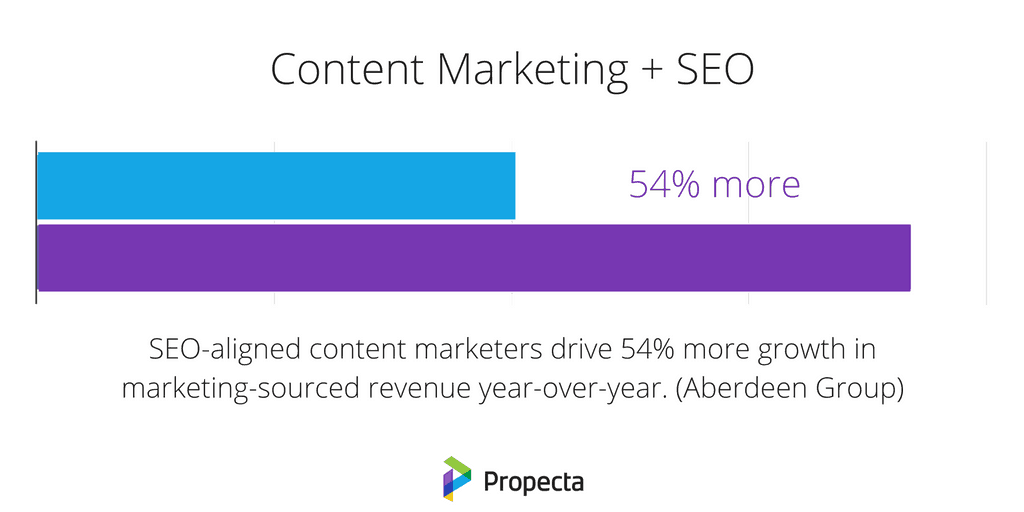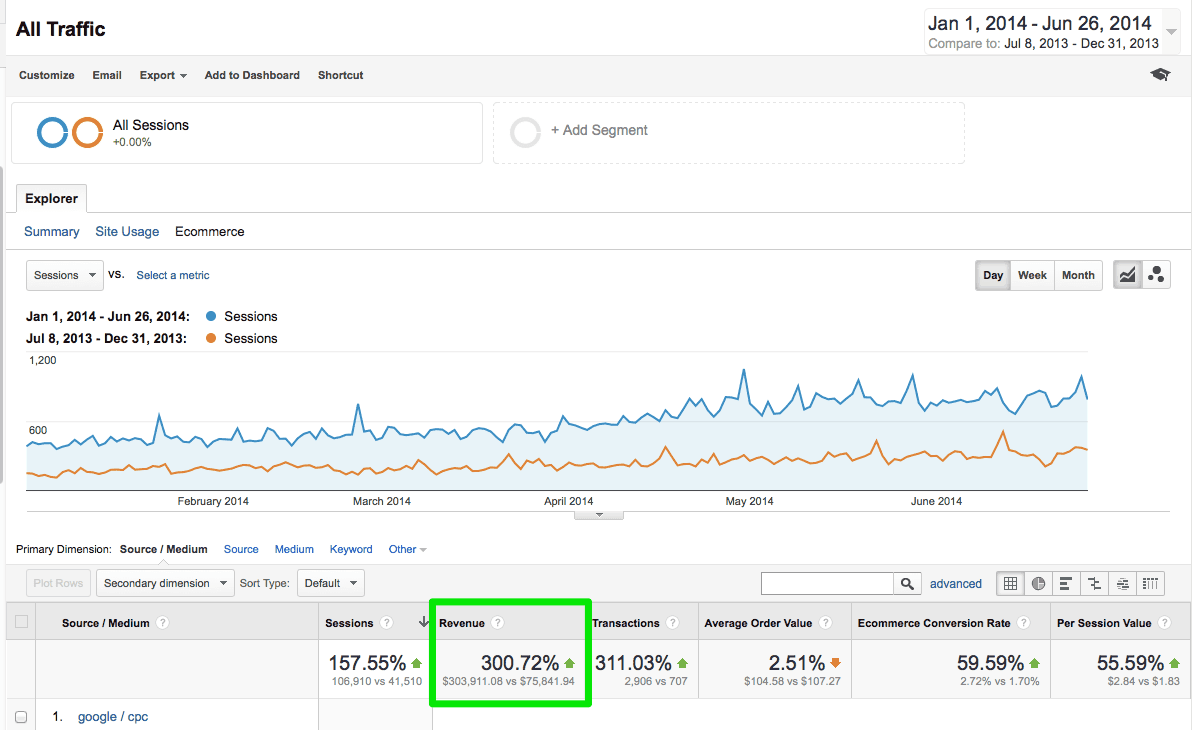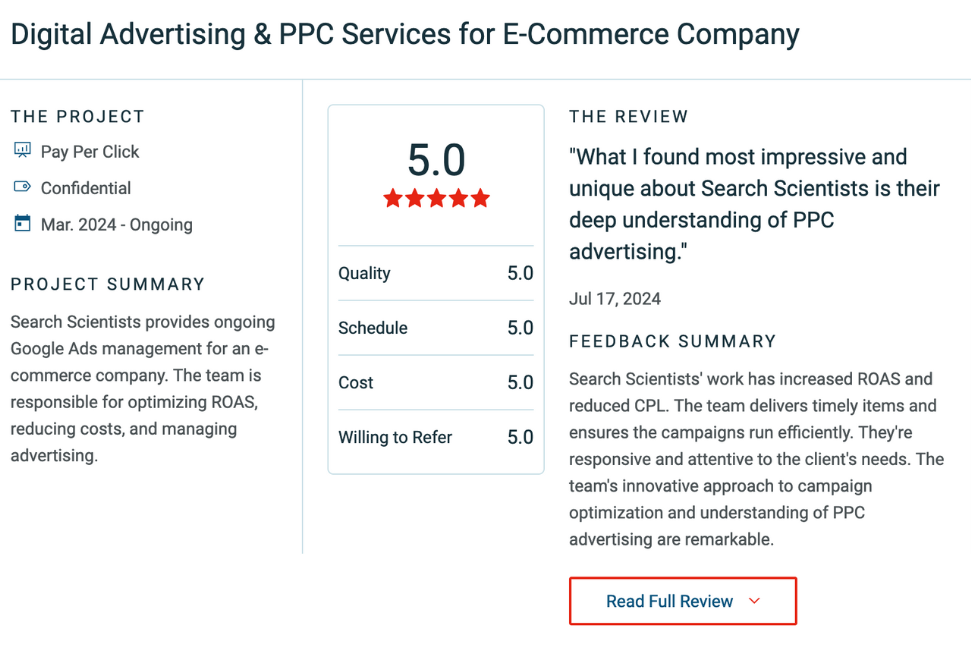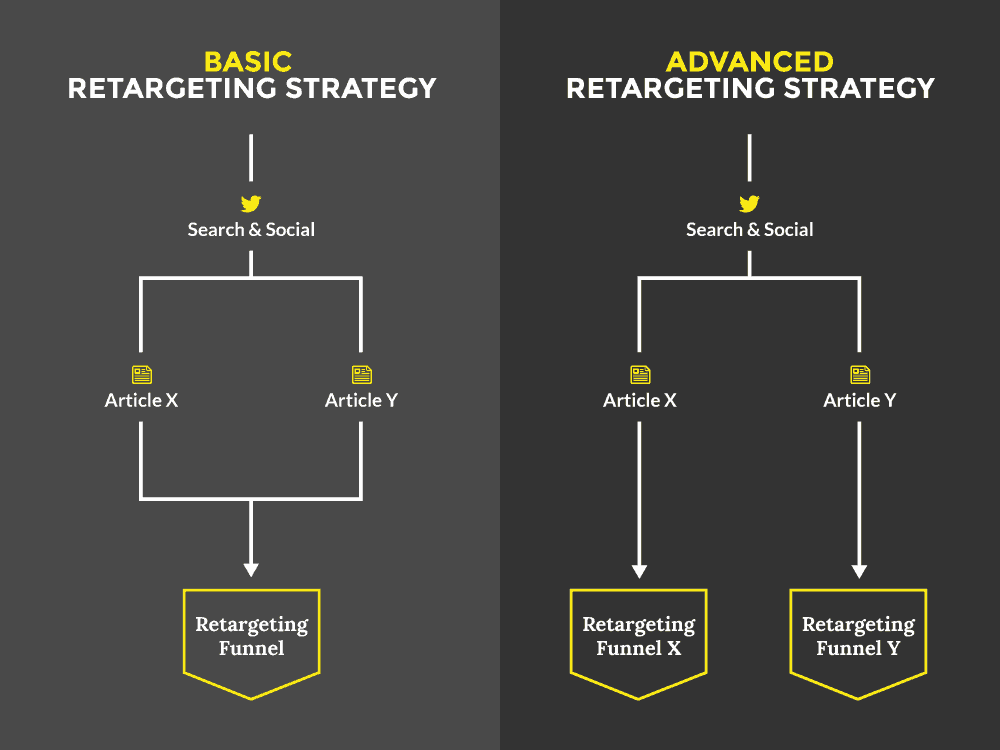When debating SEO vs. PPC, it’s important to recognize that these two strategies serve different purposes but can complement each other effectively.
SEO focuses on building organic traffic gradually through content optimization and site improvements, making it ideal for long-term, sustainable growth.
On the other hand, PPC offers immediate visibility through paid advertisements, making it a powerful tool for businesses aiming for quick results or promoting time-sensitive offers.
While each approach has its own advantages and challenges, combining them strategically can enhance your overall marketing performance, allowing you to leverage the strengths of both for maximum impact.
Table of Contents
SEO vs. PPC: Key Differences
The primary difference between SEO and PPC lies in how they drive traffic to your website.
SEO focuses on building organic traffic over time by improving your website’s visibility in search engine results.
This involves optimizing various elements of your site to rank higher in organic search results, which are the unpaid listings that appear on search engines like Google.
On the other hand, PPC provides immediate visibility through paid ads, which appear above organic listings on search engine results pages (SERPs).
While SEO emphasizes long-term growth and sustainable traffic, seo or ppc offers a shortcut to immediate visibility.
The stability of paid search is generally higher than organic search since you pay for your ad to appear in specific positions, which is often influenced by Google’s algorithms.
Understanding these fundamental differences helps in choosing between SEO and PPC.
Moreover, SEO and PPC can complement each other, enhancing your overall marketing strategy when used together.
SEO Overview
SEO, or Search Engine Optimization, improves a website’s visibility in organic search results through various strategies.
These include keyword research, creating relevant content, and optimizing title tags to make your site easily discoverable by search engines like Google.
On-page SEO optimizes your website’s content and structure, including meta descriptions, title tags, and internal linking.
Off-page SEO builds your site’s authority through strategies like backlinking, involving links from reputable sites pointing to your content.
Technical SEO makes your site easily crawlable and understandable by search engines, improving your chances of ranking higher.
Effective implementation of these strategies can significantly enhance your website’s visibility and attract relevant organic traffic.
PPC Overview
PPC, or Pay-Per-Click, is a digital advertising model where advertisers pay a fee each time pay per click ppc clicks on your ad.
This method allows businesses to buy visits to their site rather than earning them organically.
PPC ads typically appear at the top of search results, giving businesses immediate visibility. These ads are targeted based on demographics and keywords, ensuring they reach a specific audience.
Setting up a PPC campaign requires bidding on keywords relevant to your business.
Higher bids and more relevant ads achieve better positions in search results. PPC campaigns can be quickly set up and start generating traffic almost immediately, making them perfect for businesses seeking quick results.
However, the visibility of PPC ads is directly tied to your spending, and make sure ongoing investment is necessary to maintain ad placement.
When to Use SEO vs. PPC
Deciding between SEO and PPC often depends on your business goals, resources, and timelines.
SEO is ideal for businesses focused on long-term growth and sustainable traffic.
It requires time and patience, as results are gradual but build a lasting online presence.
In contrast, PPC is suited for achieving immediate visibility, making it perfect for time-sensitive promotions and product launches.
Aligning your marketing strategy with specific goals depends on your goals.
For sustainable growth with more time to invest, SEO might be the better option.
However, for quick results with sufficient budget, PPC can provide the immediate visibility you need.
Long-Term Growth with SEO
SEO is particularly beneficial for businesses aiming for long-term growth and sustainable traffic.
Unlike PPC, which requires continuous ad spend, SEO builds organic traffic over time and doesn’t involve ongoing payments for each visitor.
This makes SEO a cost-effective strategy for businesses with a long-term vision.
The results from SEO are gradual, often taking several months to notice significant changes.
However, the long-term ROI can be substantial, with industries like real estate seeing an average 3-year SEO ROI of 1,389%, especially when considering the benefits in the long run, including organic results.
Investing in SEO enhances brand credibility and achieves broad organic reach, offering more sustainable long-term benefits.
Immediate Results with PPC
For businesses needing immediate visibility and quick results, PPC is the go-to strategy.
PPC campaigns can be launched quickly and start driving traffic almost immediately. This makes PPC ideal for time-sensitive events, product launches, and seasonal promotions where immediate visibility is crucial.
To achieve these quick results, a larger portion of the marketing budget should be allocated to PPC, often between 60% to 75% for short-term objectives.
However, once you stop paying for PPC ads, your visibility disappears, necessitating continuous investment for sustained results.
We live, breathe & Dream Paid Traffic
Pros and Cons of SEO
SEO offers numerous benefits but also comes with challenges.
It improves organic search visibility, making it essential in digital marketing. It can lead to sustainable traffic growth and increased brand credibility.
However, SEO requires ongoing effort and adaptation due to frequent algorithm changes, which can impact rankings and require continuous strategy adjustments.
Balancing the pros and cons of SEO is crucial for incorporating it effectively into your marketing strategy. Knowing both the advantages and challenges helps in making informed decisions about investing in SEO.
Benefits of SEO
A key benefit of SEO is its long-term cost-effectiveness.
Unlike paid advertising, SEO builds a valuable asset that continually drives traffic without ongoing payments.
High search rankings signal trust and credibility, attracting more targeted visitors and providing a better return on investment.
Effective SEO practices drive higher organic traffic by improving search rankings and enhancing user experience.
This leads to increased engagement and conversion rates, making SEO crucial for a sustainable digital marketing strategy.
Drawbacks of SEO
Despite its benefits, SEO comes with its own set of challenges.
One major drawback is the time and patience required to see results.
SEO takes time and is a gradual process, often taking several months for significant changes.
Frequent algorithm changes by search engines can impact rankings, necessitating continuous adjustments to your SEO strategy.
SEO is highly competitive, with businesses vying for top search result positions on websites.
Competing against established sites with more resources can be challenging, making a well-planned and executed SEO strategy essential.
Pros and Cons of PPC
PPC offers several advantages, especially for businesses seeking immediate visibility and measurable results. PPC campaigns provide instant visibility and precise targeting, ensuring your ads reach the right audience.
Results can be observed almost immediately, unlike organic SEO efforts that take time.
On the flip side, PPC can be expensive, with costs escalating rapidly if not managed properly.
Small businesses may struggle to sustain PPC advertising due to limited budgets.
Additionally, continuous investment is necessary to maintain ad visibility, and stopping payments means losing visibility immediately.
Benefits of PPC
A main benefit of PPC is the instant visibility it provides.
PPC ads appear at the top of search results, offering immediate exposure.
Additionally, PPC allows for precise audience targeting based on demographics, location, and device, ensuring your ads reach the most relevant audience.
The effectiveness of PPC campaigns can be accurately measured, allowing businesses to assess their ROI and refine strategies for better results.
Metrics like cost per click (CPC) and conversion rates provide valuable insights into PPC campaign performance.
Drawbacks of PPC
Despite its benefits, PPC has several drawbacks. Costs can escalate quickly, making it potentially expensive for businesses with limited budgets.
Click fraud is another issue, where competitors or bots click on your ads without intent to purchase, wasting your ad spend.
Additionally, PPC ads do not guarantee sales; achieving conversions after clicks is essential.
Continuous financial investment is necessary to maintain visibility, and stopping payments means losing your ad position immediately.
PPC thus becomes a temporary visibility solution tied directly to spending.
Integrating SEO and PPC for Optimal Results
For optimal results, businesses should consider integrating SEO and PPC.
For optimal results, businesses should consider integrating SEO and PPC. In our work, we combine both strategies to align with client goals and create tailored proposals that deliver measurable growth. Get your proposal today.
Using SEO and PPC together enhances visibility, provides better keyword insights, and strengthens the sales pipeline.
Instead of viewing them as opposing strategies, embracing both can maximize their benefits.
Starting with heavy PPC provides quick brand visibility while building up organic SEO.
PPC can cover areas where SEO might not reach effectively, enhancing the overall digital marketing strategy.
Combining both channels drives more leads and improves understanding of the target audience.
Promoting SEO Content with PPC
PPC can promote high quality content by targeting specific keywords related to your business.
This increases the visibility of your organic content and drives more traffic to your site.
Analyzing competitor ads provides valuable insights into important search terms and traffic sources, helping refine your ppc and seo strategy.
Retargeting Organic Traffic with PPC Ads
Retargeting involves delivering PPC ads to users who previously visited your site through organic search.
This approach reminds these users, encouraging them to return and complete a purchase or engage further with your content.
Re-engaging organic visitors with targeted PPC ads can increase conversions and drive more traffic back to your site.
Using PPC Data to Inform SEO Strategies
PPC campaigns provide valuable data to inform and refine your SEO strategies.
By analyzing PPC data, businesses gain insights into effective keywords and user behavior, enhancing their SEO efforts.
Testing ideas with PPC ads allows marketers to gauge user interest and adjust SEO strategies accordingly.
Understanding the return on ad spend (ROAS) through analytics is vital for assessing PPC campaign profitability and guiding future advertising investments.
This data-driven approach ensures continuous performance improvement and effective strategy adjustments.
Creating a Balanced Marketing Budget
Creating a balanced marketing budget between SEO and PPC is crucial for achieving business objectives and navigating market dynamics.
While SEO can be cost-effective long-term, it requires proper strategies and resources. PPC campaigns need constant monitoring and optimization to avoid wasting budget.
An effective marketing budget should reflect both SEO and PPC investments based on performance metrics.
This balanced approach ensures businesses benefit from the immediate visibility of PPC while building sustainable, long-term traffic with SEO.
Budgeting for Brand Building
Investing in SEO is crucial for brand building, enhancing visibility in search results and establishing credibility with consumers.
Focusing on SEO helps brands avoid the continuous high costs associated with PPC, allowing for more sustainable budget management.
In competitive industries, securing high organic search rankings is essential for maintaining market presence.
Allocating a portion of the marketing budget towards SEO leads to long-term growth and better brand recognition compared to short-term PPC gains.
This strategic investment in SEO builds a strong foundation for brand awareness and credibility.
Budgeting for Immediate Sales
For immediate sales and quick conversions, allocate a larger portion of the marketing budget to PPC.
PPC campaigns generate quick sales and immediate returns, making them ideal for short-term objectives. Increasing PPC funding during product launches and promotions maximizes visibility and captures immediate customer interest.
While PPC requires a higher budget allocation, its quick results can justify the investment, especially for businesses aiming to meet short-term sales goals.
This approach ensures potential customers are reached quickly and effectively through ppc marketing.
Navigating Analytics for SEO and PPC
Analytics play a crucial role in optimizing both SEO and PPC strategies.
Monitoring performance across various channels provides valuable insights for improving organic search strategies.
For PPC, optimizing the account is integral, highlighting the need for continuous performance measurement.
Paid search google ads dashboards can analyze spend, revenue, and ROI to inform PPC performance and strategy.
Tools like Improvado automate the analytics cycle and identify performance improvement opportunities across marketing strategies.
Leveraging these insights allows businesses to refine their SEO and PPC efforts for better results.
Key Metrics for SEO
Key metrics for assessing SEO performance include monitoring organic traffic and user engagement metrics like average session duration.
These metrics help businesses understand how effectively their website attracts and retains visitors through unpaid search results and website traffic.
Analyzing these metrics helps refine SEO strategies to improve search rankings and enhance overall website performance.
Focusing on relevant keywords and optimizing content drives higher organic traffic and achieves sustainable growth.
Key Metrics for PPC
PPC metrics are crucial for evaluating the effectiveness and efficiency of advertising campaigns.
Metrics like cost per click (CPC), conversion rates, and ROI offer valuable insights into campaign performance.
Paid search offers unrestricted access to keyword data, enhancing marketing intelligence compared to organic search.
Understanding these key metrics allows advertisers to refine their PPC strategies for better ROI and campaign success.
This data-driven approach ensures PPC investments are optimized for maximum impact.
Summary
In summary, both SEO and PPC are essential components of a successful digital marketing strategy. SEO focuses on long-term growth and sustainable traffic, while PPC provides immediate visibility and quick results.
Each strategy has its own set of benefits and drawbacks, and the decision to use one over the other depends on specific business goals and resources.
Integrating SEO and PPC can provide optimal results by enhancing visibility, providing better keyword insights, and strengthening the sales pipeline.
A balanced marketing budget that reflects both SEO and PPC investments is crucial for achieving business objectives.
By leveraging analytics, businesses can continuously refine their strategies and maximize their ROI.
Embrace the synergy of SEO and PPC to unlock the full potential of your digital marketing efforts.
Frequently Asked Questions
What is the main difference between SEO and PPC?
The main difference between SEO and PPC is that SEO builds organic traffic gradually, whereas PPC provides instant visibility through paid advertising. Choosing between them depends on your goals and resources.
When should I use SEO vs. PPC?
Use SEO for long-term growth and sustainable traffic, while PPC is best for immediate visibility and quick results, particularly for time-sensitive promotions.
What are the benefits of integrating SEO and PPC?
Integrating SEO and PPC enhances visibility and provides valuable keyword insights, ultimately leading to a stronger sales pipeline and more effective marketing campaigns. This holistic approach maximizes your overall online presence and performance.
How can PPC data inform SEO strategies?
Utilizing PPC data can significantly enhance your SEO strategies by offering valuable insights into effective keywords and user behavior. This information allows for targeted refinements that can lead to improved performance in organic search results.
What are the key metrics for assessing PPC performance?
To effectively assess PPC performance, focus on key metrics such as cost per click (CPC), conversion rates, and return on investment (ROI), as these indicators provide valuable insights into campaign effectiveness.
Check out more blogs here:

Top Tips for Creating Ad Creatives Using Gemini and ChatGPT
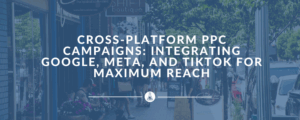
Cross-Platform PPC Campaigns: Integrating Google, Meta, and TikTok for Maximum Reach



